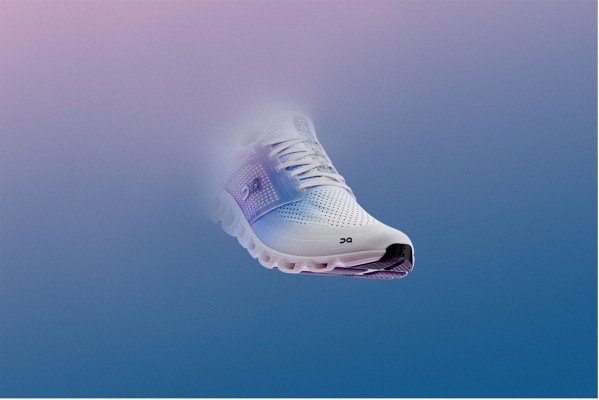Making sneakers is a dirty business; one that’s heavily reliant on fossil fuels. Shoe companies have experimented with various ways to reduce their footprints, from uppers made of recycled plastic to midsoles made of foam derived from sugarcane.
Now, there’s a new approach — upcycling. Materials startup Novoloop and running-shoe manufacturer On will announce a partnership later today to produce an outsole made with upcycled thermoplastic polyurethane. It’s one of a host of materials that are debuting with On’s new climate-friendly sneaker, the Cloudprime.
The partnership will be announced at an Elemental Excelerator event later today as part of Climate Week in New York City, and TechCrunch has exclusive details about the collaboration, Novoloop’s novel material and how it’s made.
“Our TPU has performed so well in the test that On felt confident enough to put it on the Cloudprime for the reveal. But furthermore, we’re working together on the scale-up planning to get our TPU into their shoe for mass production,” Novoloop co-founder and CEO Miranda Wang told TechCrunch. “They would like to see this replace as much of their synthetic rubbers that they’re using as possible.”
Novoloop was founded by Wang and COO Jeanny Yao in 2015, and since then, the company has developed a new way to break down polyethylene — the world’s most widely used plastic — into chemical building blocks that can be used to make thermoplastic polyurethane, or TPU, a synthetic material that’s worth far more than the polyethylene it’s made from.
Over the last year, the company has raised $22 million in Series A funding to bring its creation out of the lab.
The TPU in the On Cloudprime consists of 35% upcycled material and 65% virgin material, a ratio that Novoloop is working to change. Wang said the company is hoping to boost the upcycled fraction to 50% or greater. Today, the virgin material is coming from a fossil fuel source, though she said it’s also possible to replace it with a bio-based feedstock.
TPU is a type of compound known as a block copolymer. Polymers are long-chain molecules composed of repeating segments, and TPU has two segments, one that’s harder and another that’s softer. Novoloop’s upcycled compound, a polyol, is the soft part. It’s chained with isocyanate, the hard part, which in this version is made from virgin feedstock. That duality is what makes TPU both flexible and durable.
Novoloop’s production process gives its TPU a significantly lower carbon footprint, Wang said. It’s not just the fact that the company is using recycled material — when Novoloop breaks down polyethylene, it produces diacids, which become building blocks for TPU. The way the company creates the diacids releases “a lot less” nitrous oxide than traditional methods used in the chemical industry, Wang said. Since nitrous oxides are potent greenhouse gasses, 280 times stronger than carbon dioxide over 20 years, the impact of that change is significant.
“We’re a much lower carbon-producing process, much less polluting process in general,” she said. “The industry has had about a century of time to optimize the efficiency of its process. Without doing the process differently, they’re not going to be able to eliminate that consequence.
“What we’re demonstrating is that by making these chemical building blocks from polyethylene waste, we can do it with much greater efficiency and lower footprint.”
Novoloop’s next step is to test different sources of post-consumer polyethylene. Different regions tend to produce polyethylene bales with different qualities and levels of contamination. The company has identified regions around the country that would make sense for their larger plants, and it’ll be testing feedstock samples from those locations.
Wang said that Novoloop is on the cusp of entering the second phase of its growth plan. The first phase includes working with partners like On to demonstrate that upcycled TPU is a sustainable drop-in alternative to all-virgin materials. The second is to scale its process up for mass production.
That’ll likely require more cash, Wang said, but given what Novoloop has accomplished with their relatively modest Series A, I suspect they won’t have any trouble finding investors.
